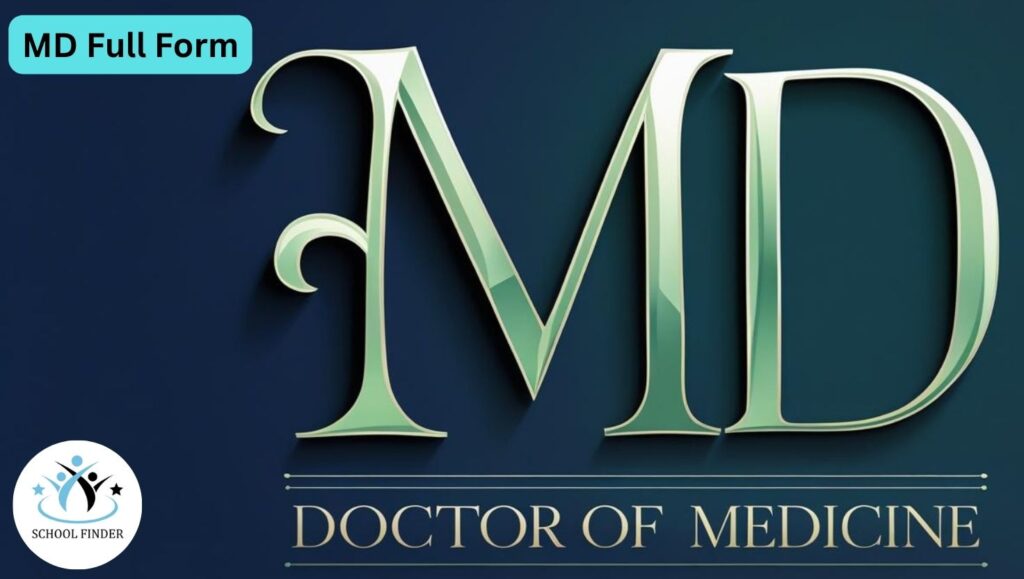MD stands for Doctor of Medicine, a prestigious postgraduate medical degree recognized and respected worldwide. Whether you are a student exploring career options, professional, a parent, or simply curious about medical education, this comprehensive guide will help you understand the full form of MD, What is it, its significance, eligibility, career prospects, and more—from both Indian and international perspectives.
What is MD? (Doctor of Medicine Full Form)
The full form of MD is Doctor of Medicine. Rooted in the Latin phrase “Medicinae Doctor” meaning “Teacher of Medicine”. It is a postgraduate degree awarded to medical graduates who have completed advanced training in a specific field of medicine. In India, students first complete their MBBS (Bachelor of Medicine and Bachelor of Surgery), followed by an MD for further specialization.
Key Differences: MD in India vs. International MD
 MBBS Full Form in Medical
MBBS Full Form in Medical
| Aspect | MD in India | MD in the US/Canada |
|---|---|---|
| Degree Type | Postgraduate (after MBBS) | Primary Medical Degree (like MBBS) |
| Duration | 3 years | 4 years (after Bachelor’s degree) |
| Eligibility | MBBS required | Pre-medical Bachelor’s required |
| Career Path | Specialization (e.g., Cardiology) | Residency & Licensing Exam (USMLE) |
MD vs. MBBS: Key Differences
| Aspect | MBBS (Bachelor of Medicine & Surgery) | MD (Doctor of Medicine) |
|---|---|---|
| Level | Undergraduate | Postgraduate |
| Duration | 5.5 years (including internship) | 3 years |
| Focus | General Medicine & Surgery | Specialized Medical Field |
| Eligibility | After 12th Science (Biology) | After MBBS |
| Global Recognition | Widely accepted | Highly respected, globally valid |
Eligibility & Admission Process
Eligibility: MBBS degree from a recognized medical college.
Admission: Entrance exams (e.g., NEET-PG in India, USMLE for the USA).
 ITI Full Form
ITI Full Form
Duration: Typically 3 years for full-time MD programs.
Career Opportunities After MD
An MD degree opens doors to high-paying and respected careers in medicine. Some top career paths include:
Clinical Roles
- Physician (General Medicine)
- Surgeon (General or Specialized)
- Psychiatrist (Mental Health Specialist)
- Cardiologist (Heart Specialist)
- Neurologist (Brain & Nervous System Expert)
Non-Clinical Roles
- Medical Researcher
- Hospital Administrator
- Medical Professor
- Public Health Consultant
Government & Private Sector Jobs
- Chief Medical Officer (CMO)
- Medical Officer in Armed Forces
- WHO & UN Health Programs
Types of MD Specializations
MD Degrees Approved by Medical Council of India
- MD in Anesthesiology
- MD in Aviation Medicine
- MD in Biochemistry
- MD in Community Medicine
- MD in Dermatology
- MD in Hospital Administration
- MD in Nuclear Medicine
- MD in Gynecology and Obstetrics
- MD in Ophthalmology
- MD in Pathology
- MD in Physiology
- MD in Radiotherapy
- MD in General Medicine
- MD in Forensic Medicine
- MD in Psychiatry
- MD in Radio Diagnosis
- …and many more.
Popular International MD Specializations
- Internal Medicine
- Pediatrics
- Psychiatry
- Cardiology
- Neurology
- Oncology
- Emergency Medicine
- Family Medicine
Benefits of Pursuing an MD Degree
- Higher Pay: MD holders often command higher salaries due to their specialization.
- Better Employment Rate: Specialized doctors are in greater demand globally.
- International Opportunities: MD is recognized in many countries, enabling global mobility.
- Positive Societal Impact: MDs play a crucial role in healthcare, research, and education.
- Career Progression: Opportunities to further specialize (DM, fellowships) or move into leadership roles.
- Continuous Learning: Medicine is ever-evolving, ensuring lifelong learning and professional growth.
MD vs. MS (Master of Surgery)
Many students confuse MD with MS (Master of Surgery). Here’s the difference:
 MS Full Form
MS Full Form
| Feature | MD (Doctor of Medicine) | MS (Master of Surgery) |
|---|---|---|
| Focus | Medicine & Diagnosis | Surgical Procedures |
| Career Path | Physician, Cardiologist, etc. | Surgeon, Orthopedic, etc. |
| Duration | 3 years | 3 years |
How to Become an MD Doctor? (India & Abroad)
In India:
- Complete MBBS (5.5 years).
- Clear NEET-PG for MD admission.
- Complete 3-year MD program in a recognized college.
In the US/Canada:
- Pass USMLE (United States Medical Licensing Examination).
- Complete a Bachelor’s degree (Pre-Med).
- Clear MCAT (Medical College Admission Test).
- Complete 4-year MD program.
- Pass USMLE (United States Medical Licensing Examination).
Conclusion
The “Doctor of Medicine” (MD) is a globally recognized and respected qualification, signifying a high level of expertise and dedication in the medical field. While the educational pathways differ across countries, the core mission remains consistent: to provide advanced, specialized medical care and contribute to the health of humanity. Pursuing an MD is a rigorous but ultimately immensely rewarding journey, offering unparalleled opportunities for intellectual growth, societal impact, and a fulfilling career.
Common Questions About the MD Degree
What is The Full Form of MD?
MD stands for Doctor of Medicine.
Is an MD Degree Recognized Internationally?
Yes, an MD degree is generally recognized internationally.
Which MD Specialization is The Most in-Demand?
Demand varies by region and evolving healthcare needs. Generally, specializations like Radiology, Dermatology, Cardiology, Neurology, and Psychiatry are in high demand.
How Long Does it Take to Become a Fully Qualified MD Specialist?
The total duration varies greatly by country and chosen specialization. In India, it’s typically 5.5 years (MBBS) + 3 years (MD) = 8.5 years. In the US and Canada, it’s 4 years (Bachelor’s) + 4 years (MD) + 3-7 years (Residency) = 11-15 years. This does not include any potential super-specialization fellowships.
Can an MD Holder Pursue a Career in Medical Research?
Absolutely. Many MDs combine clinical practice with research.
Who is Eligible for an MD?
Candidates must possess an MBBS degree or its international equivalent.
Is MD Equivalent to MBBS?
No, MBBS is an undergraduate degree; MD is a postgraduate specialization.
Can I do MD Without MBBS?
- In India: No, MBBS is mandatory.
- In the US/Canada: Yes, MD is the first medical degree (like MBBS in India).
Can an MD Doctor Perform Surgery?
No, only MS (Master of Surgery) or M.Ch (Super Specialty) doctors perform surgeries.
Can Foreign Students do an MD in India?
Yes, foreign medical graduates can pursue an MD in India if they have an MBBS (or equivalent) degree and qualify via the Foreign Medical Graduate Examination (FMGE) or NEET-PG, subject to NMC regulations.
What is the Average Salary for an MD Holder?
Salaries for MDs vary significantly based on country, specialization, experience, and practice setting (e.g., public vs. private hospital, private practice).
* USA: General practitioners can earn $220,000 – $250,000 annually, while specialists can earn $300,000 – $500,000+, with top surgeons exceeding $600,000.
* UK: Average salary for doctors can range from GBP 44,000 to GBP 77,000 (approx. INR 46-81 lakhs) for trainees, and significantly higher for consultants (GBP 98,000 to 1.32 crore INR).
* Canada: Average for physicians is around CAD 118,000, with experienced specialists earning up to CAD 327,000.
* India: While less than Western countries, MD salaries are considerably higher than MBBS salaries, often ranging from INR 10-30 lakhs annually for specialists, increasing with experience and reputation.
(Note: These are approximate figures and can fluctuate based on various factors.
Author
Rajesh Kumar Sharma is the founder of SchoolsFinders, a platform dedicated to helping parents and students make smarter education choices across Australia. With a strong focus on school rankings, academic resources, and insightful comparisons, Rajesh aims to simplify the process of finding the best-fit schools. His passion for education and commitment to accuracy ensure that SchoolsFinders remains a trusted source for families navigating their educational journey.

